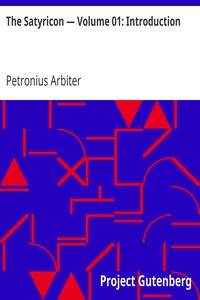The Satyricon — Volume 01: Introduction by Petronius Arbiter
"The Satyricon — Volume 01: Introduction by Petronius Arbiter" is a classic work attributed to Petronius, a Roman courtier and arbiter of elegance during the reign of Emperor Nero. This literary work, which is a satirical novel, was likely written in the 1st century AD. The primary themes revolve around the indulgent and often depraved lives of the Roman aristocracy, exploring topics such as love, sexuality, and the absurdities of contemporary society
through keen wit and humor. The narrative follows the adventures of Encolpius, a young man embroiled in a series of humorous and often scandalous escapades alongside his companions, including the cunning Ascyltos and the beautiful Giton. As they navigate the chaotic lives of their peers, the trio encounters various characters, such as the wealthy freedman Trimalchio, whose extravagant dinner party exemplifies Roman excess. The text blends dialogue and narrative with vivid descriptions, providing a rich commentary on societal norms, personal desires, and human folly, while also reflecting a pioneering use of realism in literature—a hallmark that lays the groundwork for later works in the picaresque genre. (This is an automatically generated summary.)
Read or download for free
| How to read | Url | Size | |||
|---|---|---|---|---|---|
| Read now! | https://www.gutenberg.org/ebooks/5218.html.images | 126 kB | |||
| EPUB3 (E-readers incl. Send-to-Kindle) | https://www.gutenberg.org/ebooks/5218.epub3.images | 1.3 MB | |||
| EPUB (older E-readers) | https://www.gutenberg.org/ebooks/5218.epub.images | 1.3 MB | |||
| EPUB (no images, older E-readers) | https://www.gutenberg.org/ebooks/5218.epub.noimages | 106 kB | |||
| Kindle | https://www.gutenberg.org/ebooks/5218.kf8.images | 1.5 MB | |||
| older Kindles | https://www.gutenberg.org/ebooks/5218.kindle.images | 1.4 MB | |||
| Plain Text UTF-8 | https://www.gutenberg.org/ebooks/5218.txt.utf-8 | 110 kB | |||
| Download HTML (zip) | https://www.gutenberg.org/cache/epub/5218/pg5218-h.zip | 1.3 MB | |||
| There may be more files related to this item. | |||||
Similar Books
About this eBook
| Author | Petronius Arbiter, 20-66 |
|---|---|
| Translator | Firebaugh, W. C. |
| Title | The Satyricon — Volume 01: Introduction |
| Note | Wikipedia page about this book: https://en.wikipedia.org/wiki/Satyricon |
| Note | Reading ease score: 58.4 (10th to 12th grade). Somewhat difficult to read. |
| Credits | Produced by David Widger |
| Language | English |
| LoC Class | PA: Language and Literatures: Classical Languages and Literature |
| Subject | Rome -- Fiction |
| Subject | Satire, Latin -- Translations into English |
| Category | Text |
| EBook-No. | 5218 |
| Release Date | Jun 1, 2004 |
| Most Recently Updated | Dec 28, 2020 |
| Copyright Status | Public domain in the USA. |
| Downloads | 231 downloads in the last 30 days. |
| Project Gutenberg eBooks are always free! | |


